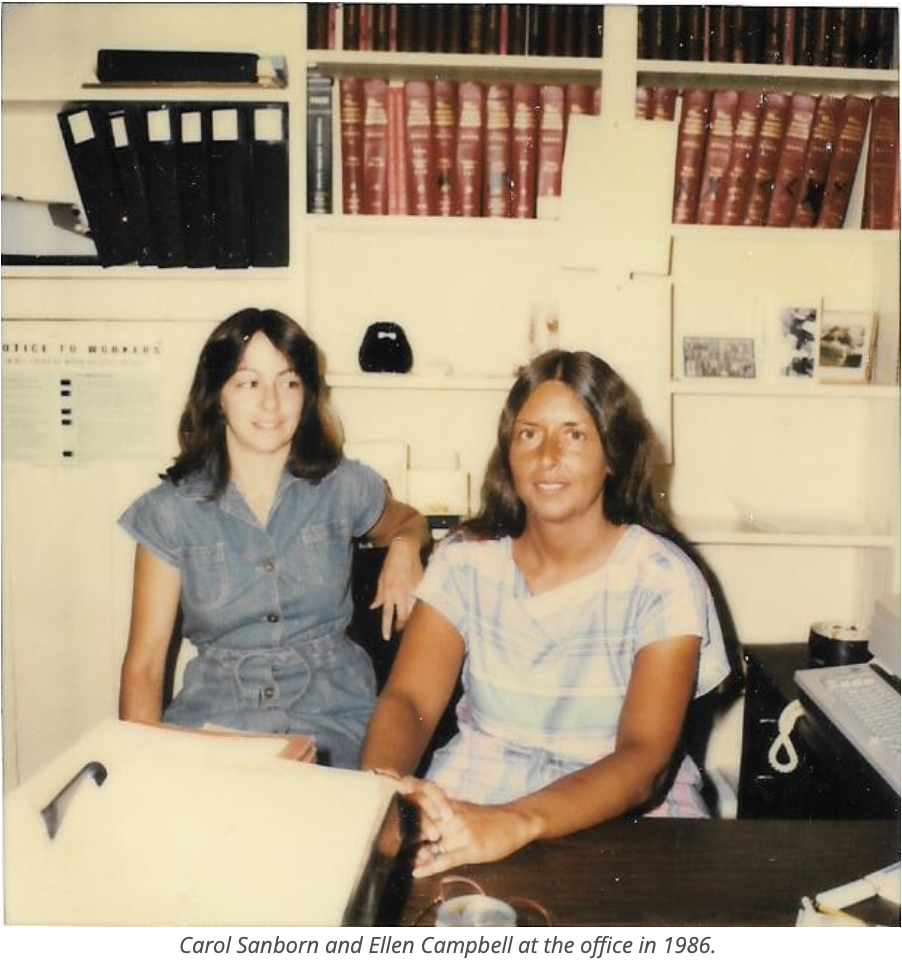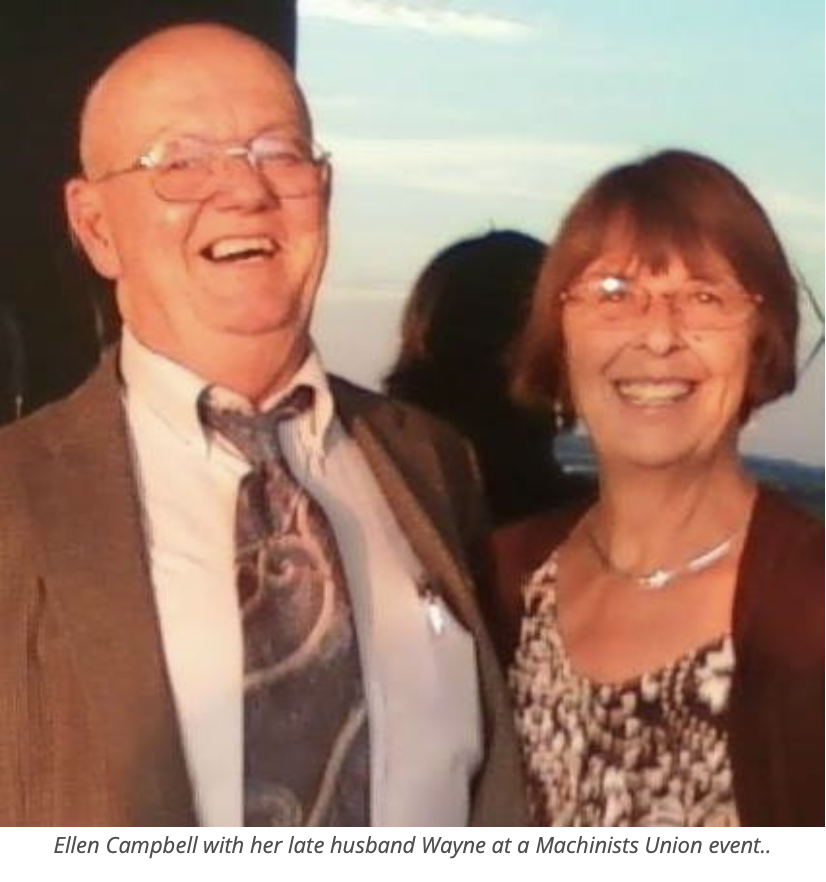2023 Maine AFL-CIO President’s Award Winner Ellen Campbell (IAMAW Local S-89): 50 Years of Helping Injured Workers

PHOTO: Campbell in front of her employer's Brunswick law firm in the 1970s.
This year’s Maine AFL-CIO President’s Award goes to International Association of Machinists and Aerospace Workers (IAMAW) S-89 member Ellen Campbell of Lisbon Falls. Campbell retired last November after working fifty years as a labor paralegal who helped thousands of workers. Campbell was also instrumental in forming her union at the firm McTeague Higbee with Local S-89.
“Ellen helped guide the cases of thousands of injured workers quietly from behind the scenes for 50 years. She was the force behind successful careers of multiple labor lawyers including Pat McTeague, Jim Case, Jim Tierney and Ralph Tucker,” said Carol Sanborn, President of IAM Local S-89 and a paralegal at McTeague Higbee. “In addition to her lifelong efforts to help injured workers, both legislatively and judicially, during some of the most difficult times in their lives, she was also an integral part of our union organizing campaign here. She has always been, 150 percent, 250 percent, solid union”
We will present the award to Ellen Campbell at our Biennial Convention on October 26.
Campbell grew up in Brunswick in a working class union family. Her mother was a homemaker and her father was a member of the Industrial Union of Marine and Shipbuilding Workers of America, which later became Machinists Local S6. On Valentine’s Day, 1972, Campbell started her first day as a temp working for attorney Pat McTeague. She had only planned to work there for six weeks and initially had no inkling that she would end up working for McTeague’s firm for the next 50 years.
In the beginning, the firm handled a variety of legal work, from court-assigned cases to divorces. Then in 1976, Attorneys McTeague, Bill Higbee, and Jim Tierney, who later went on to become a longtime Maine Attorney General, started their own firm to advocate for workers. Campbell followed them to their new practice.
“Boy, once we started, it just took off. It was really the most rewarding career I could have had,” recalled Campbell. “The philosophy was that we would never represent an employer. That gave our clients confidence that they didn’t need to worry about whether we had any ties to insurance companies.”
At the time, there were not many firms that that worked solely for injured workers and soon word spread about the practice by word of mouth. The most difficult cases they handled involved Bath Iron Works shipbuilders who had developed mesothelioma due to asbestos exposure. The firm filed claims for them under the federal Longshore Act to help them get their workers compensation benefits and survivors’ benefits for their widows and children.
“Those people just broke our hearts,” said Campbell. “They were without a doubt good ol’ Mainers, salt of the earth people who had no idea that their work was very possibly going to result in their deaths. We had to deal with the widows and the children. It was very difficult, but at the same time we could help them.”

Campbell was there for some of the biggest workers compensation fights in the Maine Legislature over the past several decades. The firm helped prepare their clients to deliver powerful testimonies about their experiences with the system while combatting negative stereotypes about injured workers. Campbell also helped McTeague and other attorneys bring many cases to Maine’s Supreme Judicial Court, generating favorable rulings and strengthening the law for injured workers today. She became known in the office as a fierce advocate for workers.
“She has kind of a spitfire personality,” said Sanborn. “She’s kind and patient with people who need her help, but for people who are causing the problems, she’s very tenacious and right on top of encouraging them to do the right thing. She’s also gracious about it. Even people on the other side liked her because of the way she approached things, but she would never give up.”
But it wasn’t easy work. It was mentally and emotionally challenging to advocate for people who are suffering from their injuries and experiencing poverty due to their inability to earn a living. The injured workers would often call the office completely overwhelmed by what seemed like an avalanche of paperwork coming from every direction. The clients were always relieved when they were told to just send all of the paperwork to the paralegal and let them deal with it.
“These were men and women who had worked all of their lives taking care of their families and now they couldn’t do anything,” said Campbell. “There were some ghastly physical injuries in addition to the horrible illnesses that people got from their jobs and it was very hard for them to admit that they needed help from anybody. They were always the breadwinners and the rock of the family.”
But as Campbell always told new paralegals, "You will be able to go home at night and feel like something you did each day made a difference in a positive way for someone.”
In 2013, Campbell and her colleagues decided that it was time to organize a union so they could have a stronger voice in the workplace. Campbell and Sanborn immediately chose to work with the Machinists Local Lodge S-89. Not only had Campbell’s father been a member of Local S6, but her husband had also helped organize Topsham town employees with Local S-89 years earlier. It was a hard struggle and took nine months to win a first contract. Campbell sat on the bargaining committee and was “totally a valuable part of that process,” said Sanborn.

When the firm was planning layoffs last year, Campbell realized that a less senior paralegal, who had been working on an important human rights case scheduled for trial in only a few weeks, would be among them. She knew that if her colleague was let go, it would leave attorney and client in a very difficult position. Although Campbell had the most seniority in the office and hadn’t planned to take retirement so soon, she stepped forward to voluntarily take retirement to save the job of another member.
“It was really good place for me to spend 50 years, said Campbell. “I never felt like I worked for anyone. I worked with some very fine attorneys who also did a lot of good. But my coworkers have a special place in my heart because I knew what they did every day. They went above and beyond, they showed up and still do.”
